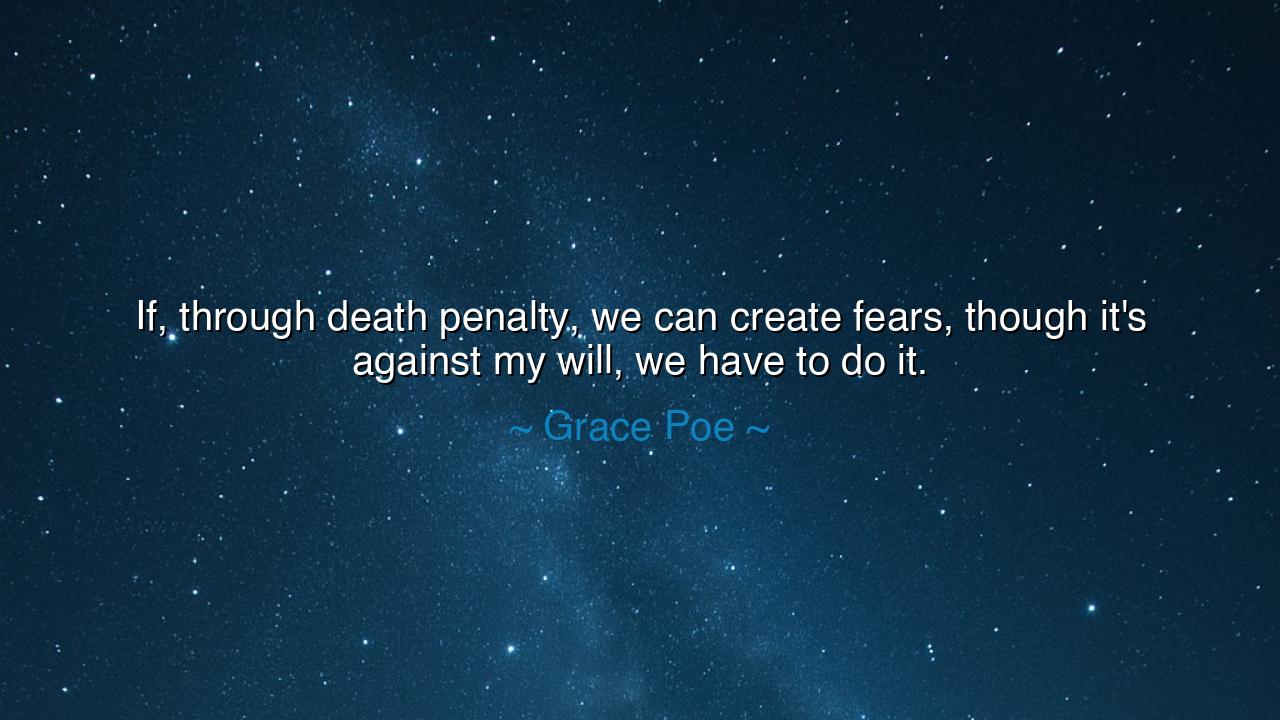
If, through death penalty, we can create fears, though it's
If, through death penalty, we can create fears, though it's against my will, we have to do it.






“If, through death penalty, we can create fears, though it’s against my will, we have to do it.” — Grace Poe
In this statement, Grace Poe, a stateswoman and daughter of a nation’s conscience, voices a truth torn between justice and mercy. Her words are not the cold decree of a ruler, but the lament of a soul wrestling with necessity — a leader who recognizes that duty and compassion often stand opposed, yet both demand to be heard. In this single sentence breathes the eternal struggle between the heart’s gentleness and the law’s severity.
She says, “Though it’s against my will, we have to do it.” In that confession lies her humanity. For she does not celebrate the death penalty; she endures it as a bitter medicine, a weapon of last resort in the defense of peace. Like the ancient judges of old who feared the weight of their own verdicts, she accepts that the hand of justice, when raised, must tremble — for every punishment carries the echo of the soul it extinguishes. This is the tragedy of governance: to serve both the good and the grim, and to wield the sword not for power’s pleasure, but for order’s preservation.
Throughout history, this dilemma has haunted all who govern. The great King Solomon, when faced with two mothers claiming one child, drew his sword not to kill, but to reveal truth through fear. Justice, he knew, must sometimes awaken dread to protect innocence. So too, Poe’s words echo this ancient wisdom: that fear, when rightly placed, may preserve the lives of many — but when used without conscience, it destroys the spirit of the nation it claims to defend.
Her quote also speaks to the fragility of society’s moral balance. When chaos rises, men cry for strength; when order returns, they long for mercy. Thus, every civilization walks the razor’s edge between compassion and control. Poe’s recognition of this truth is not a call to cruelty, but a warning of the price of peace. She admits that even when justice demands harshness, the human heart must not grow cold. The leader must remember that punishment, though necessary, is never pure.
Consider the tale of Emperor Ashoka of India, once a conqueror drenched in blood. After his great war, he looked upon the slain and felt the emptiness of victory. In his remorse, he turned from violence to compassion, from death to mercy. He saw that fear could govern bodies, but not hearts; and that no peace enforced by terror could endure. Poe’s sentiment carries the same caution — that fear can preserve order, but only love can preserve humanity.
The lesson in her words is not that death should be embraced, but that justice must be tempered by sorrow. If punishment must exist, it should be wielded by those who mourn its necessity, not those who crave its power. For a society that delights in retribution is already corrupted, but one that carries out justice with grief may yet remain righteous. As the ancients taught, “The sword of justice must never be drawn without compassion, nor sheathed without reflection.”
Therefore, let this teaching pass to the generations: power must always bow before conscience. Use strength when weakness endangers the innocent, but let that strength be guided by mercy. Do not rejoice in fear, even if fear maintains peace. The true greatness of a nation lies not in how it punishes, but in how it restrains itself from cruelty when cruelty seems easy. For only then does justice rise above vengeance, and only then does civilization prove its soul is still alive.






AAdministratorAdministrator
Welcome, honored guests. Please leave a comment, we will respond soon